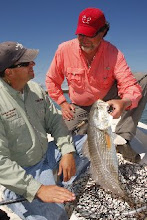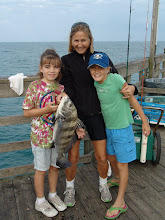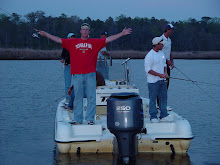
The following game fish "primer" was developed in the Spring of 2009. These two fish are far too valuable to our NC economy as sport fish to not consider all the benefits that would be realized by removing them from commercial harvest and sale.
Since these two fish are the primary targets of recreational saltwater anglers here in NC, the very elimination of "user conflict" alone is reason enough alone to seriously consider game fish protection for both species. Just and fair compensation to commercial fishermen for determined time frames could be paid for with recreational saltwater license monies for years to come.
If commercial fishing interests here in NC would consider the benefits of removing the user conflict on these two fish with game fish designation, greater support from recreational fishermen for commercial fishing would be accomplished!
Game Fish Act Primer
Due to the recent events in which a petition for rule making was presented to the North Carolina Marine Fisheries Commission on behalf of the Spotted Sea Trout, and was rejected by the commission, and the fact that the Red Drum is our state fish and is in a state of “recovery”, we feel that we are obligated by our concerns to seek a more expeditious remedy on their behalf. Prompted by the welfare of the resource, we are subsequently forced to intervene through the avenue available to us through our North Carolina General Assembly by introducing a bill that would declare the Spotted Sea Trout and the Red Drum as Game Fish.
This act would prohibit the sale, purchase, transportation for sale, barter, or any other means of exporting for profit, the Spotted Sea Trout and the Red Drum. By enacting this statute, the status of these two fish would be protected for years to come and insure the viability of the fishery and the tremendous values that they posses both recreationally and economically to the State of North Carolina and its citizens.
Since the very first Game Laws were enacted in North Carolina in 1935, management of game animals has been an effort of the government to protect the natural resources through allocation of certain animals to certain user groups for the overall well being of certain species. This action was first seen in the early days of waterfowl hunting on the Pamlico Sound when commercial hunters slaughtered waterfowl by the tens of thousands. The wildlife agencies of that day determined that species survival along with economic impacts deemed it necessary to allocate the hunting of waterfowl to recreational hunters only. The concept was sound and has been very successful both biologically and economically.
Most of our Southern Coastal states have enacted similar or more stringent statutes in their coastal waters to protect both species of these fish. Texas was the first to act by declaring game fish status for both the Spotted Sea Trout and the Red Drum in 1981, in addition to banning all forms of gill netting in all coastal waters. Other states have followed suit with the same or more stringent acts, such as Louisiana, Alabama, Florida, Georgia, and South Carolina. The precedents set by our neighboring coastal states require us to examine the positive impacts on both the protection of the species, and the tremendous financial boons that have occurred as a result of these actions.
Due to the fact that the Spotted Sea Trout and the Red Drum can be pursued year round by recreational fishermen, the recovery of the fish and the tremendous economical boost as a result in these states has been undeniable. Because of its vast coastal water sounds and tributaries which are unique to the whole nation, North Carolina would soon establish itself as the premier sport fishery state for these two fish in the whole country. While saltwater recreational anglers generated $2.5 billion in sales to businesses here in NC in 2006, Florida’s anglers were generating over $15 billion in sales that same year! Much of their success is due to the stringent laws they have in place to protect these two fish.
Management issues regarding user conflict between competing groups have been eliminated as a result of these laws, enabling marine enforcement agencies to concentrate on more serious issues that they face. Survey programs in these states have shown increases in population abundance, spawning success, angler participation, angler catch rates, and mean size of fish landed. Increase in abundance here in North Carolina is of critical importance to insure the presence of sufficient stocks to survive severe freeze-related kills.
Texas credits one of the main reasons for the turnaround in their sport fisheries is the ability to control fishing mortality is more easily managed in a “sport rod and reel fishery” than in a “commercial net fishery”.
NC creel limits on the Spotted Sea Trout for recreational fishermen need to be reduced from 10 fish per day to 6 fish per day, in addition to raising the size limit from 12 inches to 14 inches, with only one fish to exceed 25 inches. This will reduce recreational pressure on the stocks and allow greater survival of mature fish for the spawning season. These restrictions would bring NC protective measures up to date with supporting studies, and more closely mirror successful restrictions in place by our coastal neighbors
In 2007 the NC commercial catch revenues on both of these species combined was $882,220.00 state wide. We realize that this number represents revenues that are spread out in our coastal towns to commercial fishermen and their families. We are offering to mitigate those losses of revenues with monies from our saltwater license sales fund for the next three years. This money can be distributed for the buy-back of licenses, gear, and overall lost income. Please keep in mind that our goals are not to stop commercial fishing here in North Carolina. Although many of our coastal neighbors have banned all nets completely from all coastal waters as part of their management plan for all fish, that is not what we are proposing.
Statistics will show that commercial fishing interests in our neighboring coastal states currently have thriving markets. Many of these states have developed significant commercial saltwater aquaculture operations that are producing Flounder, Shrimp, and Pompano to name a few, for commercial sale as a result of this allocation.
In closing, we feel that the time has come for North Carolina to grasp the real value of these two fish, and the tremendous financial impacts that this measure would multiply throughout our entire state-wide economy. Optimum yield has yet to be recognized from the Spotted Sea Trout and the Red Drum for all North Carolinians. We believe that day has finally arrived.




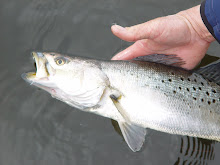



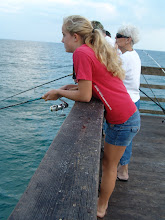

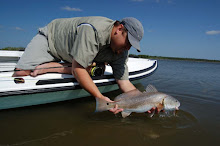.jpg)


